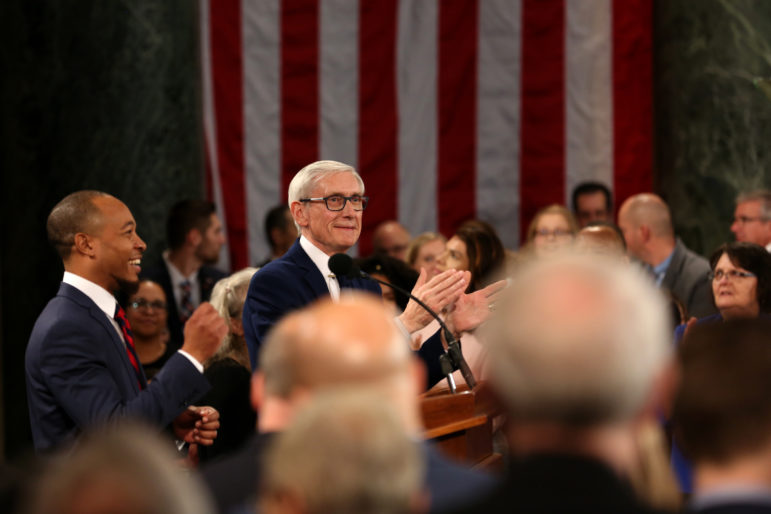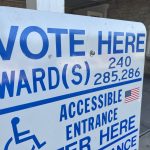Facilities Assisting Homeless Veterans Set to Close
Gov. Evers blames GOP lawmakers, who call his remarks 'simply disingenuous.'
Two facilities assisting Wisconsin veterans who don’t have housing are set to close at the end of September due to ongoing deficits and a political battle over state funding.
Democratic Gov. Tony Evers blames Republican state lawmakers, while the GOP chairs of the Legislature’s Joint Finance Committee call the governor’s attacks “simply disingenuous.”
Meanwhile, attempts are underway to find new supportive housing for nearly 40 veterans.
The facilities in Chippewa Falls and Green Bay slated to close are overseen by the Wisconsin Department of Veterans Affairs, or WDVA, under the Veterans Housing and Recovery Program, or VHRP. The program, which is staffed by Lutheran Social Services, provides temporary housing, job training and substance abuse counseling with a goal of helping veterans become stable enough to find permanent housing options.
The WDVA oversees a third facility in Union Grove that will continue operating.
The bulk of the funding for the three facilities comes from daily reimbursements from the federal government, which don’t cover the entire cost of the programming. The remaining funds come from the state and subsidized rent payments by veterans receiving services.
In a statement Monday, Evers slammed Republicans in the Legislature for not approving his request for an additional $1.9 million for the veterans housing and recovery program in the state budget he signed into law July 3. Without that funding, Evers said, the facilities in Chippewa Falls and Green Bay will close Sept. 30.
“The bottom line is that there will now be fewer options for homeless veterans as a result of the Legislature’s irresponsible decision to reject the investments that I proposed,” Evers said. “To our Wisconsin veterans, make no mistake—we will not stop fighting for you.”
In a subsequent statement shared with WPR, Joint Finance Committee co-chairs Sen. Howard Marklein, R-Spring Green, and Rep. Mark Born, R-Beaver Dam, said Evers “did not bring this topic up once” during budget negotiations.
“Our budget provided over $40 million to support new and existing veterans programs in our state, including $5 million to support our state’s veterans homes; $2.5 million to support the Veterans Community Project which provides housing and support services for veterans; and a nearly 15 percent increase in the Veterans Housing and Recovery Program, among others,” said the co-chairs. They said Evers’ request would have more than doubled the funding for the veterans program. The lawmakers accused him of “looking for a scapegoat to blame for his administration’s failure to adequately manage the changes to the program volume and demands.”
Wisconsin’s veterans housing and recovery program was already running deficit
Even before the dueling statements, the state’s veterans housing and recovery program was spending more than it took in.
In May, Wisconsin Department of Veterans Affairs Secretary-designee James Bond sent a letter to the Joint Finance Committee requesting more than $1 million to augment the program. Bond said that was due to inflationary increases, a contract with Lutheran Social Services that was more expensive than anticipated and renovation projects that temporarily reduced the number of veterans being served, which resulted in fewer federal reimbursement funds.
In an interview with WPR, WDVA Assistant Deputy Secretary Joey Hoey said the contracts with Lutheran Social Services span three years. When the agency accepted bids for its next three-year contract, LSS was the only bidder and its bid “was about 30 percent higher than we thought it would be.”
Hoey said to help offset the unexpected costs, Evers used $500,000 in federal COVID-19 stimulus funding through the American Rescue Plan Act. Those funds are now gone.
Hoey also said the 15 percent increase in veterans housing and recovery program funding referenced by Marklein and Born was an adjustment “that reflects what we have already been spending.”
An analysis by the nonpartisan Wisconsin Legislative Fiscal Bureau estimates the budget shortfall for the veterans program through 2027 will exceed $3 million.
With current and projected deficits that large, Hoey said, there were few options. Some suggested downsizing each of the three facilities, but Hoey said that would mean less federal funding for the entire program. Because the facility in Union Grove was in the best shape, Hoey said the decision was made to close the centers in Chippewa Falls and Green Bay.
Six of the 16 veterans in Green Bay have opted to move to open beds at the Union Grove building, he said. Three of the 23 residents in Chippewa Falls are also considering that option, but the agency is looking at moving others to veteran homeless transition programs in the Twin Cities.
As politicians cast blame, facilities assisting homeless veterans set to close was originally published by Wisconsin Public Radio.
If you think stories like this are important, become a member of Urban Milwaukee and help support real, independent journalism. Plus you get some cool added benefits.






















